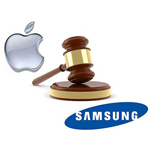
Samsung Electronics scored a point on Tuesday, June 4th, 2013, over global rival Apple Inc. in their long-running battle over mobile device patents.
The last Apple's legal victory against Samsung Electronics over patents in the U.S. is not flawless. A U.S. trade body found the Silicon Valley giant had infringed on a patent owned by the Korean company and is given a ban on the sale of certain older iPhone and iPad models sold by AT&T Inc.. The U.S. International Trade Commission, an independent federal agency, issued a limited order stopping all imports and sales for AT&T models of the iPhone 4, iPhone 3GS, iPad 3G and iPad 2 3G.
"We are disappointed that the commission has overturned an earlier ruling and we plan to appeal," said Steve Dowling, an Apple spokesman. "Today's decision has no impact on the availability of Apple products in the United States."
The ban already faces challenges because of executive orders issued by U.S. President Obama on Tuesday to tighten regulations at the Patent and Trademark Office. One order, labeled "Strengthen Enforcement Process of Exclusion Orders," called for a strict review of the procedures that the commission uses to enforce exclusion orders.
The order noted that enforcement of a ban would be difficult when the ban involves "a technologically sophisticated product such as a smartphone" because customs officials would have trouble telling the difference between a redesigned product, which would not be banned, and an older model that has been banned.
Samsung, which in August lost the patent case and was told to pay Apple more than $599 million in damages, endorsed the commission's ruling.
Designed to be a trade panel, the ITC has become a popular venue for patent lawsuits because it acts relatively quickly and it can order import bans, which are more difficult to get from district courts. Samsung said in a statement that the ITC decision "confirmed Apple's history of free-riding on Samsung's technological innovations."
Carolina Milanesi, vice president of Gartner Research, who tracks the smartphone industry, said that even if the ban went through, it would not have a huge impact on Apple. She said the majority of iPhones sold today are the iPhone 4S and iPhone 5 models, which are not included in the ban. "When the next iPhone comes out, the iPhone 4 model will be even less relevant to Apple's bottom line," she said.
"It has more to do with counting the blows between the two parties, and this is one for Samsung, but materially there is not going to be a huge impact," Milanesi said.
Dowling said Samsung's actions had not held up in courts outside the U.S.. He added: "Samsung is using a strategy which has been rejected by courts and regulators around the world."
Samsung, which is battling Apple in court in some 10 countries, had also accused Apple of infringing on three other patents, but the ITC found that Apple did not infringe these.
Apple has a parallel complaint filed against Samsung at the ITC, accusing Samsung, an Apple chip provider, of copying its iPhones and iPads. An ITC judge in that case found that Samsung had violated one patent but not a second one. A final decision is due in August.
Apple has waged an international patent war since 2010 as it seeks to limit the growth of Google's Android system. The fight has embroiled Samsung, HTC and other devices that use Android.
The ITC's decision came on the same day that President Barack Obama weighed in on curbing a totally different type of patent lawsuit - those brought by companies called "patent trolls." The disparaging name is because these companies make or sell nothing, but they specialize in suing others for infringement. Obama asked for new federal regulations on these concerns and action from Congress.